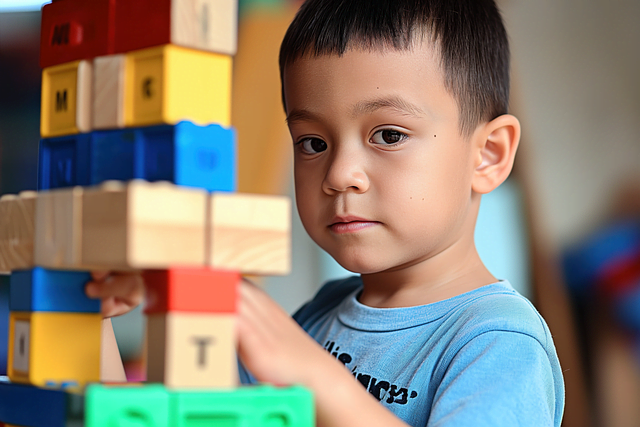What Are the Signs of Autism in Babies?
Autism Spectrum Disorder (ASD) is a developmental condition that affects how individuals communicate and interact with others. Recognizing the signs of autism in babies as early as possible is critical for early intervention, which can significantly improve developmental outcomes. Although the signs of autism in babies may vary widely, there are several common early indicators that parents and caregivers can watch for during the first few months and years of life.
Early Signs of Autism in Babies
Autism does not affect a baby’s physical appearance, but it profoundly influences how they communicate and perceive the world around them. Here are some of the most typical signs that may suggest the presence of autism in babies:
1. Lack of Eye Contact
From as early as 2 months, typically developing babies can focus on faces and make eye contact with caregivers. However, babies with autism may show a marked decrease in eye contact as early as 2 to 6 months. They may not look at faces or engage in typical social interactions that involve gazing into a caregiver’s eyes.
2. Delayed Gesturing
Gesturing, such as pointing, waving, or reaching out to communicate, is a major milestone in early childhood development. Babies with autism often display limited use of gestures by 9 to 12 months. This delay in nonverbal communication can be one of the earliest signs of autism.
3. Limited Response to Their Name
By around 6 months of age, most babies show a response when their name is called. If by 9 months your baby does not consistently respond to their name, it could be a red flag for autism. A lack of name response is often reported as one of the earliest signs by parents of autistic children.
4. Reduced Emotional Expression
Babies generally express a range of emotions through facial expressions, whether they are happy, sad, or frustrated. Autistic infants may display fewer emotional expressions, or their emotional responses may be more muted compared to other babies. This may lead to fewer smiles and less engagement in social play.
5. Delayed or No Speech
Many babies begin to babble by 6 months and say their first words by their first birthday. If a baby is not babbling, making sounds, or using words by 12 to 18 months, this could be a sign of autism. Language delays are among the most common reasons parents seek an evaluation for autism.
6. Repetitive Movements
Autism is often associated with repetitive behaviors, even in infancy. This may include actions like hand flapping, rocking, or other repetitive movements. These behaviors may become more noticeable as the baby grows older.
7. Lack of Joint Attention
Joint attention, or the ability to focus on an object or event with another person, is crucial for social development. Babies typically follow an adult’s gaze or point at things of interest by 12 months. Autistic babies may not engage in joint attention, which can affect their ability to bond with others and learn from social cues.
What to Do if You Notice These Signs
If you notice one or more of these signs in your baby, it’s important to discuss them with a healthcare provider. Early screening and intervention are critical for supporting development. The earlier a child is diagnosed, the sooner they can receive therapies that may help them develop key communication and social skills.
Conclusion
While every baby develops at their own pace, certain behaviors and delays can serve as early warning signs for autism. If you suspect your baby may be showing signs of autism, seeking advice from a pediatrician or specialist can provide the best path forward. Early intervention is key to helping autistic children thrive and reach their full potential.
The following post may interest you
AI Model Aids Early Detection of Autism with 80% Accuracy
Sources
Detection of Early Warning Signs in Autism Spectrum Disorders: A Systematic Review:
https://www.mdpi.com/2227-9067/8/2/164
A Prospective Study of the Emergence of Early Behavioral Signs of Autism:
https://www.sciencedirect.com/science/article/abs/pii/S0890856709000318
Early Motor Signs in Autism Spectrum Disorder:
https://www.mdpi.com/2227-9067/9/2/294
Early identification of autism spectrum disorders:
https://www.sciencedirect.com/science/article/abs/pii/S0166432813001940
Early indicators of autism spectrum disorders at 12 and 24 months of age: A prospective, longitudinal comparative study:
https://journals.sagepub.com/doi/abs/10.1177/1362361311399936
Clinical signs associated with earlier diagnosis of children with autism Spectrum disorder:
https://link.springer.com/article/10.1186/s12887-021-02551-0
Early Identification of Autism Spectrum Disorder: Recommendations for Practice and Research:
Emerging signs of autism spectrum disorder in infancy: Putative neural substrate:
https://onlinelibrary.wiley.com/doi/full/10.1111/dmcn.15333
Early Detection and Intervention of Autism Spectrum Disorder:
https://synapse.koreamed.org/articles/1044292
Prevalence and Early Signs of Autism Spectrum Disorder (ASD) among 18–36 Month Old Children in Tianjin of China:
https://www.sciencedirect.com/science/article/pii/S0895398814600684

